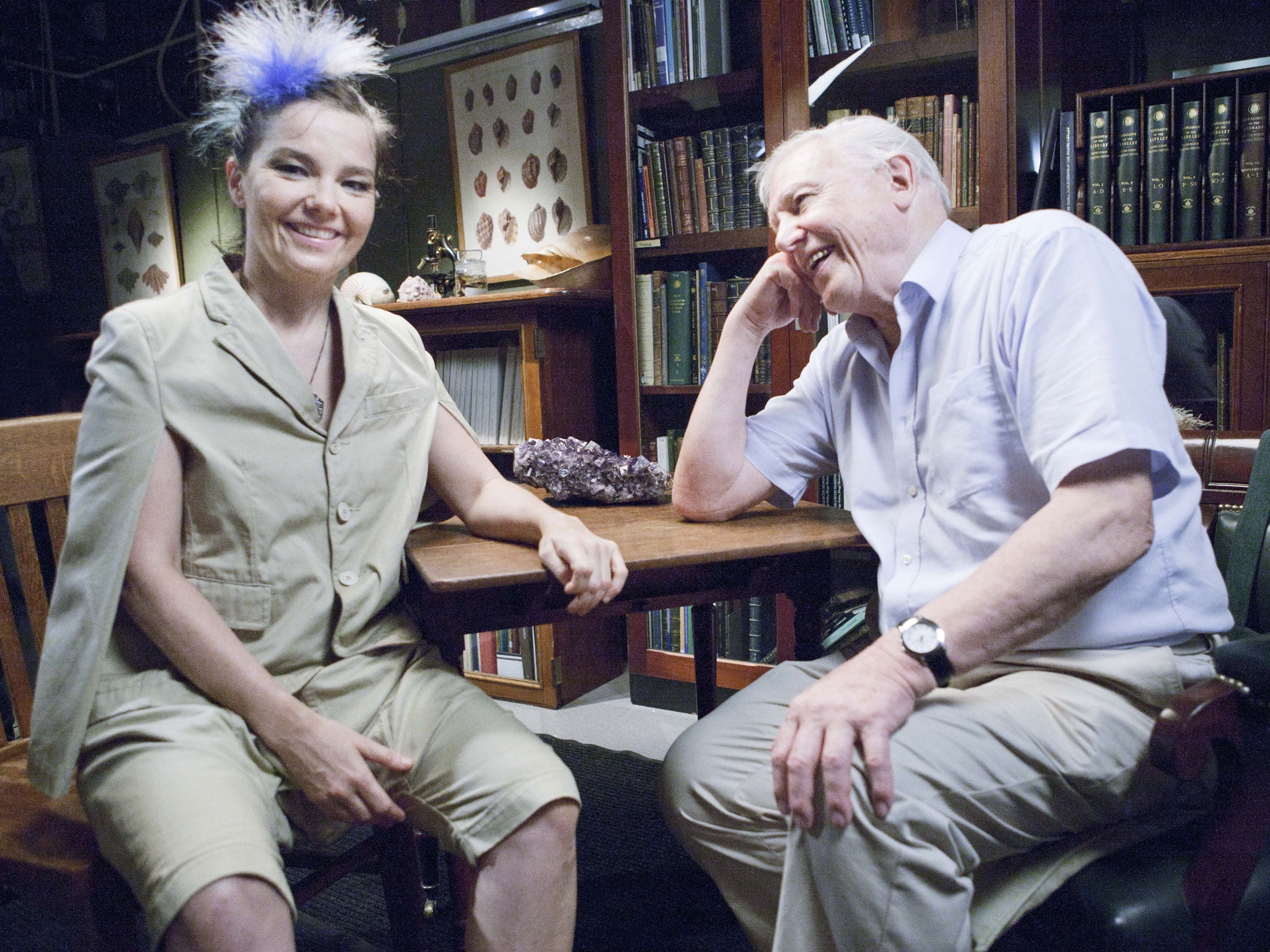TV review: When When Björk met Atttenborough - Sir David and the greater-crested Icelandic punk
An awkward encounter between broadcaster and pop star resulted in squirm-inducing viewing

The first thing to say about Björk meeting David Attenborough, is that she turned up in a safari suit, which was considerate of her. A quite batty safari suit, as you can see from the picture, rounded off with a little cape. But if Attenborough noticed Ms Gudmundsdottir's effort, it wasn't recorded for When Björk Met Attenborough. That may have been because there wasn't room for such niceties in the broadcast version of the conversation. Instead, much time was given over to a narration which felt compelled to tell us over and over how amazing, momentous, and momentously amazing this meeting of great minds was: "In a very special encounter, Björk and David Attenborough will discover what happens when their worlds come face to face." That sort of thing. A lot.
The respective worlds of the musician and a natural history broadcaster were obvious, but the prospect of the two debating the use of "nature and technology to explore music in a new, radical way" was intriguing. But how were the makers going to fit all that into an hour? Actually, they weren't going to bother, because it turned out that the programme wasn't much more than a promo for Björk's last album, Biophilia, and its tour. We saw her rehearsing an Icelandic choir. We saw her sing along to a "sharpsichord", an extraordinary, giant pin barrel harp amplified by two large horns. She also twiddled about with a tablet computer app that bypasses musical notation in the pursuit of a more intuitive approach to music-making.
All of which would have been bearable had her chats with Attenborough revealed much. The 87-year-old doesn't so much speak in complete paragraphs as lectures in complete chapters. In their conversations – on crystallography, the power of the human larynx, et al – Attenborough was in transmit mode, jabbing away with his index finger. All Björk could do was chip in now and then, in her Reykjavik by way of south London accent. When the big man let rip on the notion that all "song" in the natural word is about sex, and so, therefore, is popular music, Björk reacted as we all did, I suspect, and looked a bit embarrassed.
For on-screen chemistry last week, all eyes were on Dominic West and Helena Bonham Carter. The pair gamely took on the doomed task of playing Burton and Taylor (BBC4, Monday ***). In the event, West played Richard Burton as a stuffy old ham and HBC portrayed Elizabeth Taylor as a needy pill-head. He lacked Burton's authority, she Taylor's mystery, but who wouldn't have come up short?
This was the last of BBC4's bio-dramas – a victim of cuts. They'll be missed. Burton and Taylor was a fitting illustration of their virtues: cheap but good-looking, limited in scope but scrutinising pertinent moments in their subjects' lives.
In the case of the romance that for 20 years burned up the big screen, newspaper front pages, and two sets of wedding vows, the writer William Ivory chose the couple's 1983 appearance in a Broadway production of Private Lives. Two decades before, the pair had titillated the world with "Le Scandale", their adulterous affair during the filming of Cleopatra. Here, their audience had come to laugh along with the uncomfortable resonances between Noël Coward's leads and the once-great lovers. A vulnerable moment for both, then, and it was this quality that West and Bonham Carter best suggested.
For those who recall fondly Frank Bruno's heroics in the boxing ring, his fall was horribly public. "Bonkers Bruno" was the unforgivable line from The Sun on his diagnosis in 2003 of bipolar disorder. A decade on, having been sectioned several times, he doesn't look great to be honest: defensive, reluctantly on medication, his famous chuckle hollow with self-doubt. And as we saw in the exemplary and touching BBC3 documentary, Rachel Bruno: My Dad & Me (Tuesday ****), a happy ending is a long way off. Bruno's condition is lifelong.
Simply and intelligently, the film touched on many aspects of the disorder, not least the thorny prospect that it might in fact underlie some of its victims' greatest successes. Was the lovable Frank we all recall merely a manic moment in Bruno's condition? As Rachel put it: "I haven't met my dad. I know who 'Frank Bruno' is."
Join our commenting forum
Join thought-provoking conversations, follow other Independent readers and see their replies
Comments